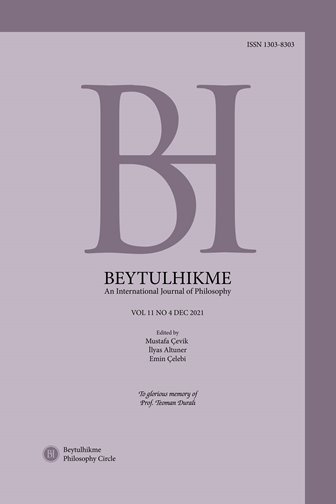Author :
Abstract
Sophokles’in Antigone’si, çağlar boyunca güncelliğini yitirmeyen önemli bir metin olarak çokça yorumun konusu olmuştur. Bu yorumların çoğunun, Antigone’nin temsili işlevine odaklandığını görmekteyiz. Buna göre Antigone, polis düzenine karşıt olarak akrabalık düzenini temsil etmekte ve politika alanını bu alanın bütünüyle dışında kalarak etkilemektedir. Ancak Butler’a göre bu yorum, Antigone’nin eyleminin politik doğasını gözden kaçırma riski taşır. Zira Antigone, temsil işlevinin kendisini krize sokan bir muğlaklığa sahiptir. Bu çalışmada tam da muğlaklığın, Antigone’nin eylemini politik bir eylem kılma olanağına işaret ettiğini ve bu olanağın da Jacques Rancière’in politik olanı yeniden düşünme ve tanımlama çabasından hareketle ele alınabileceği savunulacaktır. Böyle bir okuma aynı zamanda Antigone’yi farklı bir perspektiften hareketle ele alma imkânı taşımaktadır.
Keywords
Abstract
Sophocles' Antigone, an important play that has not lost its actuality throughout the ages, has been the subject of many interpretations, most of which focus on the representative function of Antigone. Accordingly, Antigone represents kinship as opposed to the polis and influences the political sphere by being completely outside of it. For Butler, this interpretation risks overlooking the political nature of Antigone's action because Antigone carries an ambiguity that puts the representative function itself into crisis. In this study, it will be argued that this ambiguity as such points to a possibility of considering Antigone's action as a political act, and this possibility can be put forward by following the attempts of Jacques Rancière to rethink and redefine the political. Such a reading also provides the opportunity to consider Antigone from a different perspective.
Keywords
- Aristoteles. (1983). Politika. (M. Tunçay, Çev.) İstanbul: Remzi Kitabevi.
- Butler, J. (2007). Antigone'nin İddiası: Yaşam ile Ölümün Akrabalığı. (A. Ergenç, Çev.) İstanbul: Kabalcı Yayınevi.
- Chanter, T. (2010). Antigone’s Liminality: Hegel’s Racial Purification of Tragedy and the Naturalization of Slavery. K. Hutchings, & T. Pulkkinen (Dü) içinde, Hegel's Philosophy and Feminist Thought: Beyond Antigone? (s. 61-85). Palgrave Macmillan.
- Davis, O. (2010). Jacques Ranciere. Polity Press .
- Hegel, G. (1986). Tinin Görüngübilimi. (A. Yardımlı, Çev.) İstanbul: İdea Yayınları.
- Honig, B. (2013). Antigone, Interrupted. Cambridge University Press.
- Hyppolite, J. (1974). Genesis and Structure of Hegel's Phenomenology of Spirit. (S. Cherniak, & J. Heckman, Çev.) Evanston: Northwestern University Press.
- Jagentowicz Mills , P. (1996a). Introduction. P. Jagentowicz Mills (Dü.) içinde, Feminist interpretations of G.W.F. Hegel (s. 1-24). The Pennsylvania State University Press.
- Jagentowicz Mills, P. (1996b). Hegel's Antigone. P. Jagentowicz Mills (Dü.) içinde, Feminist interpretations of G.W.F. Hegel (s. 59-88). The Pennsylvania State
- Kojève, A. (2012). Hegel Felsefesine Giriş. (S. Hilav, Çev.) İstanbul: Yapı Kredi Yayınları.
- Loraux, N. (1998). Mothers in Mourning. Cornell University Press.
- May, T. (2008). The Political Thought of Jacques Rancière: Creating Equality. Edinburgh: Edinburgh University Press .
- May, T. (2010). Contemporary Political Movements and the Thought of Jacques Rancière: Equality in Action. Edinburgh : Edinburgh University Press.
- Mills, P. J. (1996). Hegel's Antigone. P. J. Mills (Dü.) içinde, Feminist Interpretations of G.W.F. Hegel (s. 59-88). The Pennsylvania State University Press.
- Platon. (2009). Devlet. (S. Eyüboğlu, & M. Cimcoz, Çev.) İstanbul: Türkiye İş Bankası Kültür Yayınları.
- Rancière, J. (2005). Uyuşmazlık: Politika ve Felsefe. (H. Hünler, Çev.) İzmir: Ara-lık
- Rancière, J. (2007). Siyasalın Kıyısında. (A. U. Kılıç, Çev.) İstanbul: Metis Yayınları.
- Rancière, J. (2014). Demokrasi Nefreti. (U. Özmakas, Çev.) İstanbul: İletişim
- Sophocles. (2013). Antigone. D. Grene, R. Lattimore, M. Griffith, & G. W. Most (Dü) içinde, Sophocles I: Antigone, Oedipus the King, Oedipus at Colonus (E. Wyckoff, Çev.). Chicago, The University of Chicago Press.
- Sophokles. (2020). Antigone. (A. Çokona, Çev.) İstanbul: Türkiye İş Bankası Kültür
- Steiner, G. (1996). Antigones. Yale University Press. Öz: Sophokles’in Antigone’si, çağlar boyunca güncelliğini yitirmeyen önemli bir metin olarak çokça yorumun konusu olmuştur. Bu yorumların çoğunun, Antigone’nin temsili işlevine odaklandığını görmekteyiz. Buna göre Antigone, polis düzenine karşıt olarak akrabalık düzenini temsil etmekte ve politika alanını bu alanın bütünüyle dışında kalarak etkilemektedir. Ancak Butler’a göre bu yorum, Antigone’nin eyleminin politik doğasını gözden kaçırma riski taşır. Zira Antigone, temsil işlevinin kendisini krize sokan bir muğlaklığa sahiptir. Bu çalışmada tam da muğlaklığın, Antigone’nin eylemini politik bir eylem kılma olanağına işaret ettiğini ve bu olanağın da Jacques Rancière’in politik olanı yeniden düşünme ve tanımlama çabasından hareketle ele alınabileceği savunulacaktır. Böyle bir okuma aynı zamanda Antigone’yi farklı bir perspektiften hareketle ele alma imkânı taşımaktadır. Anahtar Kelimeler: Antigone, politika, eşitlik, politik eylem, Rancière, politik özneleşme, uyuşmazlık.
- [*] Bu çalışmanın ana teması, 7-9 Aralık 2020 tarihleri arasında İzmir Demokrasi Üniversitesi





